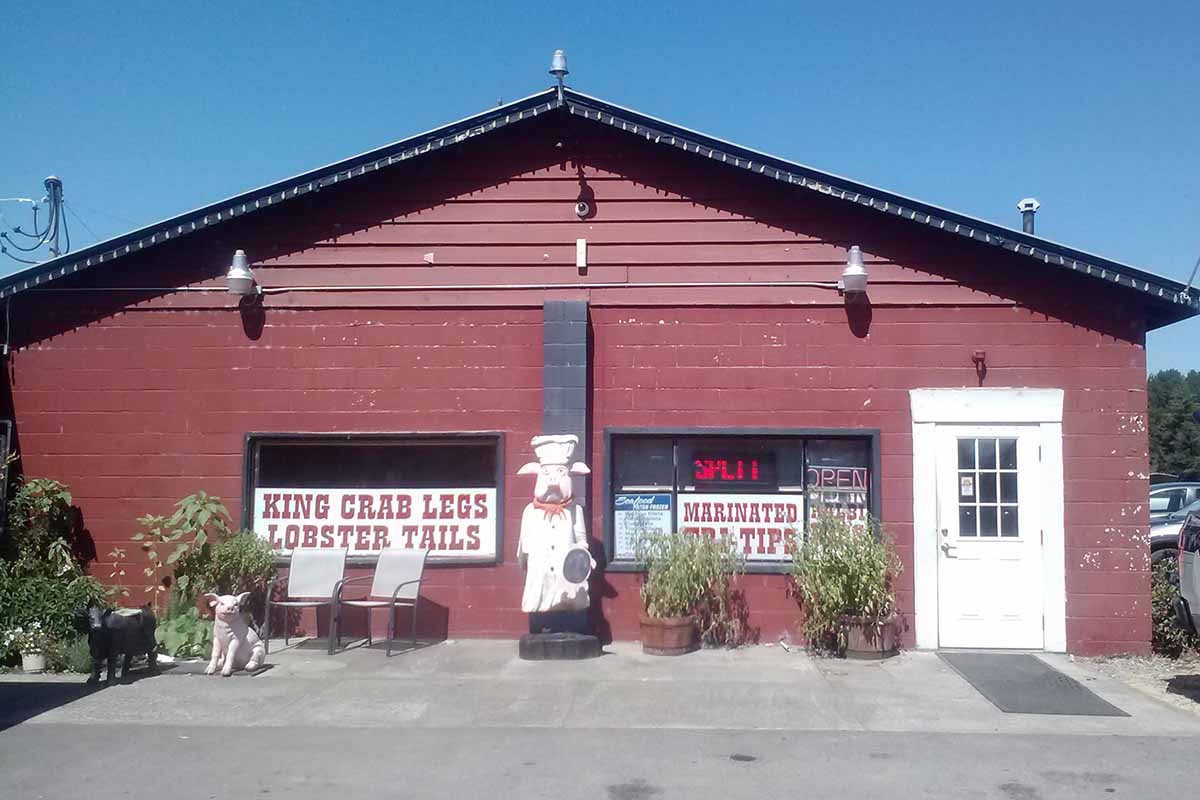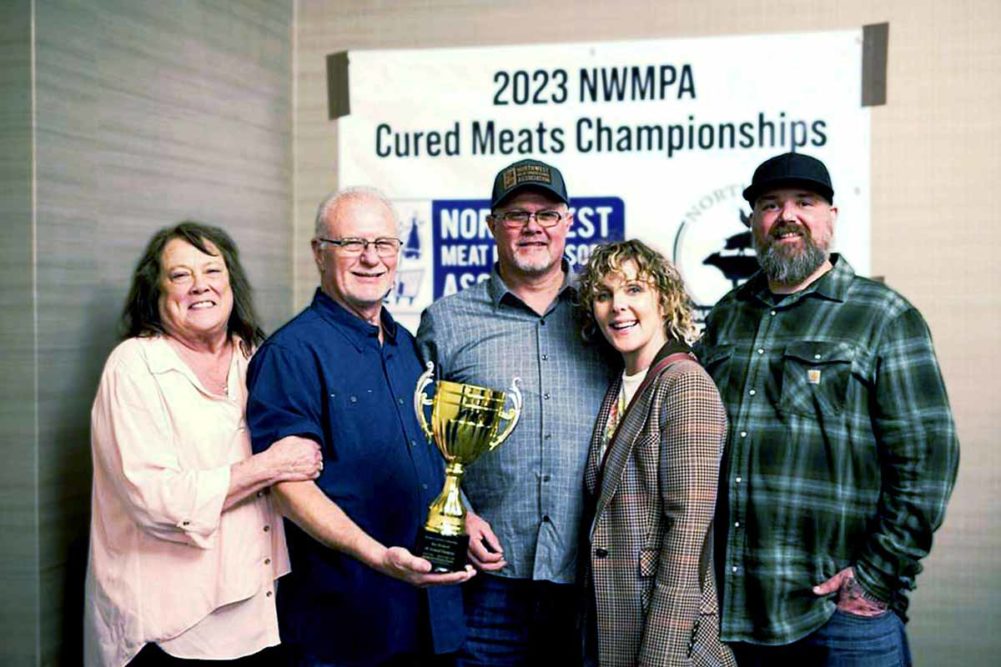At the age of 56, Greg Olson was concluding a career working for PepsiCo. in Washington State and felt there was an opportunity to buy a small meat business and in the future be able to spend more time with his family. He and his wife Marcia found a fixer-upper building in Enumclaw in 2002 and within three months turned the 5,000-square-foot location from shambles into Olson’s Meat & Smokehouse.
“The idea was to rely on my former experience working on custom processing and at a few locker plants, work hard for six months a year when most animals were being harvested and then take time off to relax for three to six months,” Greg recounts. “We wanted to keep the family together.”
The renovations needed to open the retail meat and custom processing house took three months and the work was done largely by family and friends. Ever since, the meat shop has kept family members working side-by-side. And that six-months-a-year schedule expanded into a 12-month regimen.
All in the family
Greg, now 76, and his wife remain in the ownership role. Marcia handles the bookkeeping and financial end of things. Greg does the buying and prides himself on his marketing and promotional skills.
Their son Adam had years of experience working in sales and marketing with Pepsi Co. and in meat shops. Today, he serves as the manager of Olson’s Meat & Smokehouse. Adam, now 58, confides that he first picked up a boning knife at the age of seven and tried cutting meat when his dad wasn’t looking. When Greg wasn’t around, Adam said the other butchers let him work with them.
Operating under state inspection, the meat shop has a workforce of between 12 and 15, including Greg’s children, grandchildren and close friends. About a third of the business space is dedicated to retail, which accounts for nearly 70% of the volume. Another 30% of revenue comes from custom processing.
Adam took advantage of the opportunities afforded to members of the Northwest Meat Processors Association (NWMPA) by meat science professors Bob Dickenson at Oregon State University and Ron Richards at the University of Idaho to attend special classes to help perfect his meat processing skills. Tapping into those new talents, he worked to convert about a third of the available plant space into a modern sausage kitchen where he churns out an expanding variety of specialty items like landjager, summer sausage, snack sticks, pepperoni and other sausage items that seem to endlessly win awards at cured meat competitions sponsored by the NWMPA. Adam also served a couple of terms on the board of directors for that organization.
In their first outing at the American Association of Meat Processor’s (AAMP) Cured Meats Championships, the company took home two grand championships, one for a rasher-style bacon made with eye of pork loin and another for summer sausage.
“I don’t know how many awards we’ve won in competition,” Greg said. “We display many of the plaques on the wall, but we have many more still in the boxes. I think we’ve won as many as a dozen awards in a year, but we’re proudest of our grand champion wins. That’s something special.”
 Source: Olson's Meat & Smokehouse
Source: Olson's Meat & Smokehouse
A community affair
There is an abundance of small farms surrounding their community of 30,000, and many of the owners of those five-acre parcels raise a few head of livestock for their own consumption. This creates a strong demand for custom processing services that the Olson business offers.
Olson’s also schedules mobile slaughtering and processing services through three friends who operate mobile units that can harvest the animals right at the ranch or farm. Sending out those rigs to areas as much as 70 miles away, having the mobile unit operators collect for the service and pay the plant a fee for scheduling, and allowing the plant to make more value-added final products keeps everyone happy. They list the charges on the company’s website olsonsmeat&smokehouse.net.
During hunting season, Olson’s processes more than 500 deer, elk, goats or other big game for hunters and turn the meat into a laundry list of items like jerky, snack sticks, sausage or specialty products.
“We want our hunting customers to know what we can do,” Greg said. “I say feed the people by letting them sample our finished products, in a variety of flavors. They can’t taste something through a glass window, so we serve it to them, whether it’s a sample of cheese or meats products, we let them experience what we offer.”
In this little meat shop that does so much, there is also a base for catering that is run by daughter Darci under the name of Hanny’s Catering. She and her husband are available to prepare the meats, sides and all the trimmings for events that customers can pick up for office parties, reunions, or other gatherings. They offer everything from pulled pork, barbecued beef, pork, or buffalo back ribs, seafoods, and even whole hog barbecues with a flair. Try a Hawaiian pig roast for example, or even a boneless and whole hog stuffed with pork shoulders, meaning no waste or extra time serving. They will also go off premises to serve those foods when requested.
Greg and Marcia’s original idea about opening a seasonal shop to give them time off and hold the family on common ground was far short of what has blossomed in the Olson family.
“I just can’t take credit for what has been accomplished,” Greg confessed. “I’ve got to thank those small processors from NWMPA and AAMP who always took time to talk to us, answer our questions and share their ideas and concepts to make us better.
“Then there were folks like those meat scientists Bob Dickenson and Ron Richards who always made themselves available to us, to give us pointers and let us constantly improve to stay ahead of the competition. To them we owe a debt of thanks and gratitude.”
Outside help is great for any meat enterprise, yet it remains clear internal thinking and creativity that is the lifeblood of small family businesses like the Olson’s.
As an example, Adam, thinking out loud, reflected on the vast number of small breweries (nearly 30) that dot the area around King County, the largest in the state:
“If we look at getting USDA inspection in our sausage kitchen, there would be an opportunity to produce a custom made sausage that we could make and let them market it under their own brewery name.” 



